
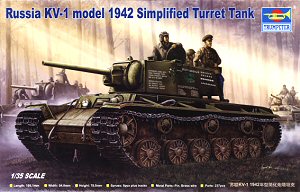
Russia KV1 (Model 1942)
Simplified Turret Tank
Trumpeter Kit No. 00358
1:35th Scale
Review by Terry Ashley
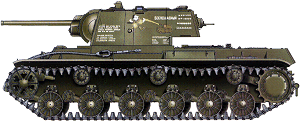



The kit consist of consists of 305 parts in light grey plastic with 2 in clear plastic, a length of copper wire for the tow cables, some poly caps for the wheels plus the decal and instruction sheets and offers a number of alternate parts with many parts from kit #00359.
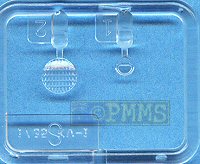
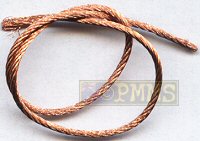
The quality of the mouldings is excellent and on a par with the recent ‘Emil’ kit
with clean crisp details and a minimum of pin parks with those present being
very shallow for easy removal.
There is some very minor flash around some parts but a quick pass with model
knife or wet and dry deals with this along with the normal small mould seams
on the parts.
While there is not a lot of parts there are many small finely moulded parts and excellent surface details such as weld seams and bolt/rivet head details that all add to the overall quality feel.
The kit as mentioned offers a few a optional parts that require the locating holes to be opened up in the hull and engine deck parts before assembly so check the instructions and decide if you will use the optional parts and open up the holes accordingly.
Lower Hull:
The lower hull has a traditional tub with bottom, sides and front panel to
which is added the separate outer side and rear panels, this allows different
side details to be incorporated without replacing the whole tub, quite nifty.
The fit of the side panels to the hull is excellent and once attached form
a trough at the top for fitting the upper hull panels.
The side panels are different from the other kits in that is has squared off rear profile and the axle and final drive locating plates are again included with all other details such as axle bump stops, return rollers and final drive mounts added as well as the separate axles. These have hexagonal locating stubs that fit into corresponding hexagonal holes in the hull sides ensuring they are positioned at the correct angle and have separate axle hubs with the correct number of bolts for this version.
The ribbed steel road wheels are made up of the inner and outer wheel which trap a poly cap between them for easy fitting to the axles and look very good when compared to photos of the real wheels but remember there are three types of steel wheel used on the KV series so make sure you are looking at the right ones.
The drive sprockets have bolt head and other details on both sides of the inner and outer disc as well as having the central hub disc as two separate parts with the correct number of retaining bolts for this version.
The idler wheel mount has a three part tensioning arm for good definition while the idler wheel has the two wheel discs with excellent rib details and the three part return rollers with separate hub cap are also the correct type for this model KV with well defined details and finally there is a the drive sprocket mud clearing device fitted to the rear hull sides which you have to fit at the same time as the drive sprockets as it is very difficult to fit the sprockets once the cleaning devise is in place.
At either end are separate towing attachments and shackles, these have sizable mould seams but should be easy enough to clean up.
Tracks:
You are given a choice of full length vinyl tracks or pre-formed sections of
plastic link and length track to use depending on your choice with the vinyl
track having excellent details on both sides and looks very good for this
type of track and is also very flexible to help with track sag. The plastic
track incorporates pre-formed track sag along the top run and another long
section for the ground run and individual links for around the drive and
idler wheels. The details on the plastic track are again excellent but there
are some shallow pin ejector marks on the inside to be removed which shouldn’t
be a problem.
Just a quick note here if you prefer fully workable tracks, check the KV Resource Page for the various track sets now available for the Trumpeter KV kits.
Upper Hull:
The upper hull panels are in two sections with the forward section including
the turret race forward to the glacis and the rear engine deck; this allows
easy replacement of the engine deck for other versions without replacing
the whole upper deck. The fit of these panels to the lower tub is excellent
with any minor edge gaps small enough to be filled with glue as you attach
the panels. Added to the top panel is a separate turret ring which allows
more details to be included than if the ring was moulded with the hull top,
but unfortunately there is a series of pin ejector marks around the ring
that will have to be filled while at the front is a separate smooth finish
nose cap.
Features added for this version are the large V shaped bullet splash shield in front of the turret ring and on the outer edges of the engine deck with nice weld seam details. Note you have to open up the locating holes for the forward shield before attaching the upper hull panel.
There are subtle weld seams on the forward hull section and excellent bolt head and panels details on the engine deck as well as inner vanes under the two side intake grills. These side intake grills are interesting in that they are moulded solid with nice mesh details as well as offering a choice of grills, one with rounded end profiles and other with one flat end profile (see images) and you should check references to see which applies to particular vehicles. Being moulded solid these grills obviously hide the inner vanes but there will no doubt be after market etched screens produced and already having the inner vanes is nice forward thinking by Trumpeter.
The front crew hatch has a separate hatch lip and the hatch has interior latch details as well as a small hinge to allow the hatch to be positioned open if required. On the driver’s plate is the added armour panel for this version as well as a separate visor cover, horn with separate wiring ducting, the head light with separate clear lens and three part machine gun mounting as well as separate periscope cover on the hull top all with well defined details.
The engine deck is different from previous models with the square welded rear section and has separate round inspection hatches again with interior latch details and hinge as well as a new separate engine access hatch and optional centre hatch (you have to open up the locating hole to add this if required). Also added to the engine deck are eight very small lifting eyes that will need careful removal from the sprue and in gluing, with tweezers being the order of the day.
The original round domed engine access hatch is also included to use as an alternative if desired, but check references to see which is most applicable.
At the rear are two additional panels that make up the engine louvers under the curved rear hull panel and the exhaust outlets are also separate parts with the fit of the centre panel and all parts are excellent with out any trimming needed.
The copper wire provided is used for the two tow cables and are attached to the later style end shackles which are hollowed out using slide moulds allowing the cable to fitt centrally for a realistic finish.
Fenders:
These are full length either side with very nice surface details of rivet heads
and securing strips as well as a nice outer lip and also include the longitudinal
centre stiffening bar on the undersides. You have to open up a few locating
holes for the fender storage boxes and other fittings applicable to this
version before assembly, so check the instructions carefully and there are
some shallow pin marks on the underside that are easy to remove.
One thing of note here is the forward side panel between the fender and glacis which is included with the main fenders and moulded using slide moulds resulting in well defined details on this panel.
The fender supports are all separate parts for good definition with the fit of the fenders to the hull being very good and again any minor gaps will be filled with the glue residue as they are attached. There are alternate fender supports provided with the solid type and the hollow type for variety depending on the version being modelled.
It should also be noted that the fenders in the two later kits with steel road wheels (00358 and 00359) are 1.5mm narrower than the fenders in the earlier kits with resilient road wheels (00312 and 00356).
The Turret:
The new square welded turret has the main shell and lower turret ring section
with the join between the rear overhang made to represent the interleaved
plates around the bottom edge. The welds around the top edge of the turret
are very well done and
include the top ventilator and hatch lip with all other parts separate.
On the top is the early style forward sighting periscopes with separate base
plates as well as the later square type commander’s scope and the later
style side and rear facing periscope covers as well as two very fine grab handles.
The top hatch again has internal latch details and separate hinge allowing
this to be shown open but there are no interior details to show.
Additional small auxiliary armour panels are included which were sometimes fitted to the lower turret sidewalls and you should check references to see if these are applicable to your model.
You actually get the choice of two gun mounts and armaments with the original ZIS-5 mantlet with very well defined bolt heads and weld seams that look quite impressive with the barrel moulded in one piece with the muzzle hollowed out using slide moulds although there is a minor moulding seam to be removed.
The other alternative is the flame thrower mantlet that includes a 45mm gun with outer cover to make the gun look like a standard F-32 and using this mantlet actually turns the vehicle into a KV-8 flame thrower version. The details on the gun muzzle are excellent in depicting the inner 45mm gun muzzle and the mantlet also has very well defined details around the flame thrower muzzle with different outer rounded gun mounts and top cover and offer quite an alternative from the standard gun tank.
The mantlets fits snugly between the outer rounded gun mounts while at the rear is a three part machine gun mounting with equally well defined details.
Instructions:
These are the usual exploded view drawings and are very clear and easy to follow
although you should read the opening steps carefully to determine what if
any locating holes need to be opened up for the different fittings
Decals:
The decals are nicely printed with thin carrier film cropped close to the printed
image and give you markings for one vehicle with a large cartoon type graphic
on both sides plus extensive stencilling and kill markings for a very colourful
finish to the overall green paintwork. A full colour sheet is included showing
the vehicle and can be used a painting guide as well as showing the decal
placement.
No markings are provided for the KV-8 alternative unfortunately with reference
photos of these often showing large turret numbers.
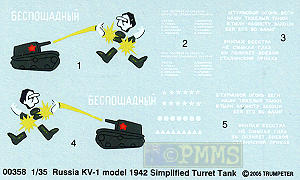
Conclusion:
Another excellent KV kit with well defined details and alternate parts for
the hidden KV-8 variation makes this a very attractive kit with a good excuse
to buy two to build both versions. The kit which is a quantum leap ahead
of the ancient Tamiya kits and more recent Eastern Express offerings and
is sure to be welcomed by allied modellers.
Highly recommended.
The Sprues: Click on thumbnails for larger view








Detail Images




Close new window to return to review
References:
| KV-1 Soviet
Heavy Tank of WWII - Early Variants Tankograd Soviet Special No. 2002 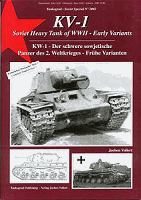 |
KV-1 & 2 Heavy Tanks 1939-1945 Osprey New Vanguard 17 ISBN 1-85532-496-2 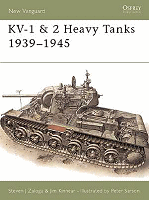 |
Ground Power
Magazine #75 - 8/2000 Published by GALILEO Publishing Co.,Ltd. 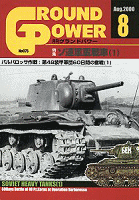 |
| Russian Tanks and Armored Vehicles 1917-1945 Schiffer Publishing ISBN: 0-7643-0913-7 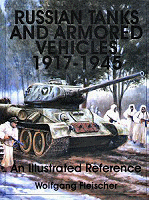 |
Stalin's Heavy Tanks 1941-1945 Concord Armor at War Series #7012 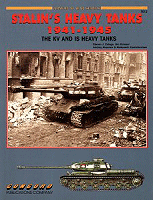 |
Stalin's Giants KV-1 & KV-II Schiffer Publishing ISBN: 0-8874-0404-9 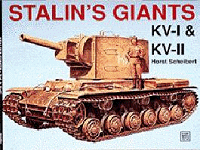 |
| KW Wydawnictwo Militaria #34 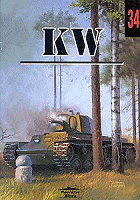 |
KW Vol.I Wydawnictwo Militaria #163 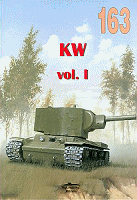 |
KW Vol.II Wydawnictwo Militaria #168 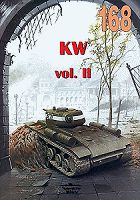 |
Kit courtesy of my Credit Card and the excellent service from Rainbow Ten.
Page created 29 July 2005